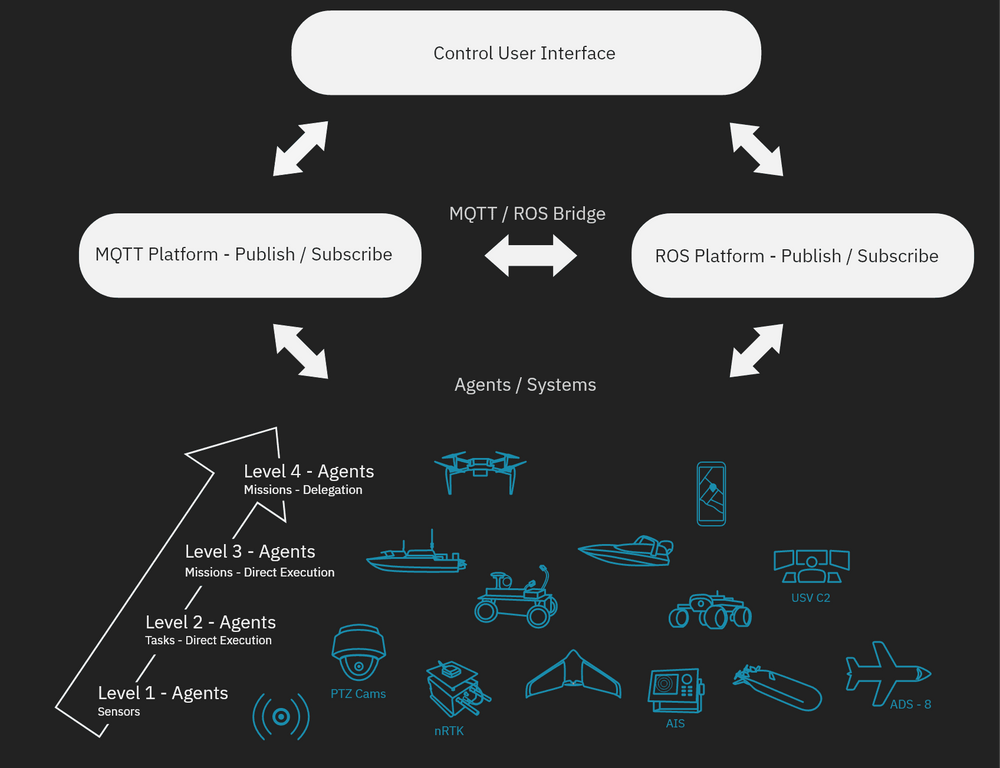
THE IMPLEMENTATION OF CAPABILITIES IN THE CORE SYSTEM
Services in the Core System
The Core System contains multiple services, which is defined as a block of code that can be performed by agents and other services. It is implemented through MQTT and follows the API specification found on this page. Services can also be complementary, meaning that they can aid agents in performing tasks, such as a route planner service. It can be described as the implementation of capabilities in the Core System. Listed below are the services provided in the Core System.
MQTT
Broker
The broker is a central part of the Core System and can be described as a message bus that transports information but that does not store information. The broker makes information from agents and services in the Core System available to other services in the Core System, thereby allowing for services to access and act on the information. To exemplify, a drone that is connected to the Core System has information regarding its position. That information is sent to the broker and can therefore be accessed by Atlas (which is a tool in the core system). Atlas can then use the information about the position to show the position of that drone in the map. The broker is a EMQX broker and utilizes the MQTT protocol, and supports MQTT protocol 3.1, 3.11, and 5.0. The broker can be connected through MQTT or through Websockets. The data structure in the broker follows the WARA-PS API-specification that is available on this page.
WARA-PS MEDIA PLATFORM
Datasets
WARA-PS supports researchers with data through data collection opportunities and available datasets. To ease the storing and sharing of data the WARA-PS media platform has been created. On the media platform multiple forms of data is available, for example data sets, 3D models, photos and films as well as documentation and data logs. In order to access the media platform an account is required, to get an account, please contact us through the contact form that can be found on the contact page.
VIDEO STREAMS IN THE CORE SYSTEM
Video Server
The video server is a server that gathers and handles all the streams that are produced in the Core System. The server receives streams from both agents in the Core System and the mobile app agent. The streams can then be seen from the video dashboard.
CLOUD ENVIRONMENT
ER-DC Cloud Computing for WASP
Ericsson Research Datacenter (ER DC), is a research facility used by thousands of developers in different internal and external collaboration projects. We provide a free cloud environment for WASP researchers. On top of the cloud environment AI frameworks and CI/CD pipelines are offered. To get an account, just reach out to the ER DC support desk: [email protected]
ER DC is equipped with over 1000+ x86 servers and around 200 Nvidia GPUs, which are connected over a 100 Gbps Mellanox network fabric. A wide range of boards and equipment, e.g. FPGA-boards, smart NICs, NVMe-cards, etc. are available for use in demonstrators and evaluations. The data hall is almost 400 square meters and designed at a max power supply of 1.5 MW. It is fully redundant with diesel generators for back-up power, double power lines, fire protection and redundant external connectivity at 10 Gbps. In addition, a bare metal lab environment is available for custom design configurations. The data center is connected to several edge nodes and thus providing an experimental platform for applications on the continuum. The data center and the cloud deployments are heavily instrumented and provide lots of operations data.
MAP DATA
Map Server
The Map Server is a server that can provide mapdata to web applications in the form of maptiles. The map data can then be used by the webservices that requires such content. The data provided by the Map Server is in a format (rasterized png files) that makes it possible for a map engine to display. Atlas is an example of a webservice that uses and displays data from the Map server.
USSP
U-Space Service Provider
The U-space service provider (USSP) functions as an air traffic control tower by managing the airspace in which the agents included in the Core System operates within. Before a drone can move in the airspace it will need approval from the USSP as well as a flight plan. Both individual drones and drone operators can send requests to the USSP. The USSP is dynamic since it can change flight instructions based on new events and circumstances in the airspace, thereby making the drone adapt to the new situation. The purpose of the USSP is to maintain a safe and efficient airspace.
